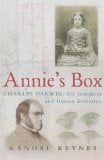 Annie’s Box: Charles Darwin, His Daughter and Human Evolution
Annie’s Box: Charles Darwin, His Daughter and Human Evolution
by Randal Keynes
4th Estate, £16.99, ISBN 1841150606
On 23 April 1851 Charles Darwin’s beloved ten-yearold daughter Annie died after a long illness. Randal Keynes’ book argues that this bereavement marked a turning-point in Darwin’s life and work: “After Annie’s death, Charles set the Christian faith firmly behind him” (p.222) and threw himself further into the researches which were to result in The Origin of Species and The Descent of Man. Keynes is Darwin’s greatgreat grandson, and has access to an impressive archive of family papers and artefacts, including the “box” which gives the book its title. Annie’s box was a portable writing-desk (the Victorian equivalent of a laptop computer) filled with her personal possessions. After her death, her griefstricken parents treasured it as a memento of her, and it became a family heirloom.
Annie’s short life is central to this book. Keynes posits that Darwin’s theories on the evolution of humanity from apes were formulated partly by observing his children’s growth from babies to fully sentient beings. But does Keynes over-estimate the effect of Annie’s death? Would Darwin’s scientific research have led him to reject Christianity anyway? Yes, probably, but Keynes’ book is none the less interesting for that.
The book offers a detailed and reliable account of Darwin’s life, which will be welcome to those of us intimidated by the prospect of ploughing through Moore and Desmond’s authoritative biography (Darwin, by Adrian Desmond, James Moore, 1992, ISBN 0140131922). Keynes’ touching picture of the Darwins’ family life makes the book eminently readable even for those with no great interest in Darwin. Of course, this scholarly and erudite book will not be welcomed in Fundamentalist Christian quarters where it will be yet another red rag to the Creationist bull. But for skeptics, that’s a definite recommendation!



